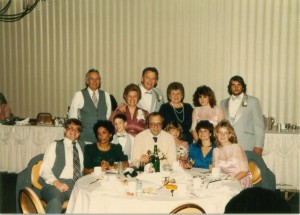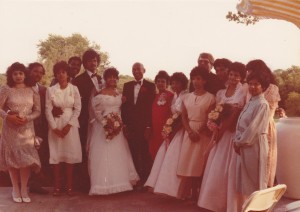I am half Indian Guyanese Hindu and half Hungarian Dutch Welsh Cherokee Catholic. My maternal great-grandparents emigrated from India to Guyana, a then British colony in the West Indies / South America that is predominantly Asian Indian. My mother immigrated to the United States when she was 19. When I was born, a Hawan, or religious ceremony, was held to welcome me into the Hindu world.
My paternal grandmother was Hungarian; her parents immigrated to the United States, met while here, and my grandmother was born in Queens. My paternal grandfather’s ancestors have been in the United States since the 1500s and, as best as we can tell, they were Dutch and Welsh, with a little bit of Cherokee. My grandfather was born in Missouri. When I was born, I was baptized to welcome me into the Catholic world.
It is normal for people to question me about my race and/or begin talking to me with the assumption that I am XYZ race. Sometimes, when strangers mistake me for one of “their own people,” this leads to cool conversations. Usually, having to explain myself all the time is exhausting.
The following are real conversations I’ve had over the past twenty years while fielding the “What are you?” question.
STRANGER1: “What are you?”
ANNA: “I am half Indian and half white.”
S: “India Indian or Native American Indian?”
A: “India Indian.”
S: “What part of India is your family from?”
A: “My family is actually from Guyana.”
S: “Isn’t that in Africa?”
A: “No, you’re thinking of Ghana. Guyana is in South America.”
S: “I thought you said you weren’t Native American.”
STRANGER2: “What part of India are you from?”
ANNA: “I’m from New Jersey.”
S: “But you look so Indian! You must be from India.”
A: “My family is from India.”
S: “I thought so. This is what I meant. Where is your family from?”
A: “My mom is actually from Guyana. Her grandparents immigrated there from India.”
S: “Ew, Guyana? Never mind. . .”
ANNA: “I’m half Guyanese and half white.”
ACQUAINTANCE1: “You’re Guyanese?!”
A: “Yes.”
A1: “You don’t look Guyanese.”
A: “What does a Guyanese person look like?”
A1: “Well, now that I sit here and talk with you I can see that you’re Guyanese but I can’t see by looking that you’re Guyanese.”
COWORKER1: “What are you?”
ANNA: “I am half white and half Indian.”
C1: “Dot or feather?”
PATRON1: “Do you have some Indian connection?”
ANNA: “Yes, I am Indian.”
P1: “You are Indian??!”
A: “Well, I am mixed. I am half Indian and half white.”
P1: “But you don’t have an Indian name. How can you be Indian??”
A: “My name is Indian.”
P1: “No, it is not.”
A: “Have you ever seen the movie Kabhi Haan Kabhi Naa? Shah Rukh Khan’s character was in love with [an Indian] girl named Anna.”
P1: “That girl was Christian. Anna is not an Indian name.”
FAMILY FRIEND: “In Guyana we have a dish called ‘cook up rice.’ It’s made by—”
FAMILY MEMBER: “She’s Guyanese! Don’t try to explain to her what cook up rice is like she doesn’t already know. Do you know who her grandmother is?!”
FF: “You’re Guyanese?!”
ANNA: “Yes.”
FF: “You don’t look Guyanese.”
ACQUAINTANCE2: “The problem with Guyanese women is they have dark skin, they wear such red lipstick, and they dress so provocatively, but you don’t look Guyanese at all. There is nothing wrong with you.”
STRANGER3: “What are you?”
ANNA: “I am half Indian and half white.”
S3: “India Indian or Native American Indian?”
A: “India Indian.”
S3: “What part of India is your family from?”
A: “The Mumbai area.”
PATRON2: “Do you have some Indian connection?”
ANNA: “Yes, I am Indian.”
P2: “You are Indian??!”
A: “Well, I am mixed. I am half Indian and half white.”
P2: “Oh, I thought your husband was Indian or something. I saw your 24K bangles so that’s why I was asking.”
A: “I thought you were asking because I look so Indian.”
P2: “Yes,” the questioner gasped, as if seeing for the first time. “You do!”
COWORKER2: “What background is ‘Coats’?”
ANNA: “What?”
C: “What background is ‘Coats’?” My coworker stared at me intently.
A: “Oh, I’m mixed. I’m half white and half Indian. The Dutch part of my family Anglicized their last name.”
ACQUAINTANCE3: “What kind of food do you cook at home?”
ANNA: “Just about everything.”
A3: “No, what kind of food do you cook at home?”
A: “Just about everything. Recently I’ve been cooking a lot of Korean and Persian food at home but I also cook Indian, Thai, Hungarian, Italian. . . just about everything.”
ACQUAINTANCE4: “What nationality are you?”
ANNA: “I am American.”
A4: “No, I mean what nationality are you?”
A: “I am American.”
A4: “No, I mean where are you from?”
A: “I am from New Jersey.”
A4: “No, I mean what is your background?”
A: “You mean what is my ethnicity?”
A4: “Whatever, you know what I mean.”
FRIEND1: “I hate the way Asians act like they’re better than everyone.”
ANNA: “What?! We are Asian!”
My friend considered this. F: “Wait a minute, how are you Asian?”
COWORKER3: “Someone asked you if you were Puerto Rican?! You don’t look Puerto Rican. You look Chinese.”
NEIGHBOR: “Are you half black and half Jewish? One of my friends is half black and half Jewish and you look just like her.”
CLASSMATE1: “Can we hang out? I just started seeing this Egyptian guy and I need someone to teach me how to cook real curry.”
CLASSMATE2: “Did you hear that some Indians bought the old abandoned Pizza Hut and turned into some sort of Indian vegetarian restaurant? I’m telling you, those people are taking over. It’s like the town isn’t even ours anymore.”
ANNA: “When I die, I want to be cremated. It just makes sense with the limited amount of land on the earth.”
BOYFRIEND1: “Of course you will be cremated. You are Hindu. You were born Hindu and you will die Hindu.”
ANNA: “I know it’s Christmas Eve but I don’t want to go to church.”
AUNT: “You are going to church because it will make me happy.”
ANNA: “But I will not be happy. I’m not Catholic and I don’t like going to church.”
AUNT: “Oh yes you are. You were baptized and confirmed Catholic, and you are going to church.”
STRANGER4: “You look so exotic. Can you teach me Spanish?”
STRANGER5: “You know, I love Indian food.”
STRANGER6: “I’d love to get to know you better. One of my friends married a white woman.”
FRIEND2: “You don’t look white at all. Do you really pass for white in New Jersey?”
UNCLE: “Is that Mexican guy still after you? I bet he’s really proud of himself thinking he got himself a white girl. Boy, is he in for a surprise!”
BOYFRIEND2’S FATHER: <<exclaimed after getting through a slow checkout line>> “I hate Indians! I wish they would all go back to where they came from!”
The boyfriend later comforted me, “My dad didn’t mean what he said before. And anyway, he doesn’t think about you as Indian, so he didn’t mean you.”
DATE: “If we had children together they would be ¾ Indian. It is important to me my children are raised with Indian values so they will know they are Indian.”
<<later in the same conversation>>
D: “You are not Indian. You are too far removed from the motherland. Why do you think you are Indian??”
I find it interesting that when a white person asks some form of the “What are you?” question, they usually focus on my Indian half, defining me as an exotic other. This is not just limited to white people; in a country where white is the norm, black and Hispanic people also usually focus on my “exotic” Indian half. In my experience, East Asians usually do not question my answer. However, when an Indian person asks me some form of the “What are you?” question, they usually focus on how I am not Indian, how white and American I am, also defining me as an exotic other.
It is not as though people cannot visualize a multiethnic and multicultural person; I stand before them. This leads me to question, “Who gets to define race, ethnicity, identity, and group inclusion? Does it matter?”


Anna Coats
Children’s Librarian at East Rutherford Memorial Library
Rutherford, New Jersey
Editing assistance provided by Melissa Cardenas-Dow and Raymond Wang.
Resources
National / Racial Identity
Bald, Vivek. Bengali Harlem and the Lost Histories of South Asian America. Cambridge: Harvard UP, 2013.
Bald, Vivek, Miabi Chatterji, Sujani Reddy, and Manu Vimalassery, eds. The Sun Never Sets: South Asian Migrants in an Age of U.S. Power. New York: New York UP, 2013.
De Castro, Aníbal, Mark Kurlansky, Junot Díaz, Edwidge Danticat, and Julia Alvarez. “Two Versions of a Dominican Tale.” New York Times. 31 Oct. 2013.
Dewan, Shaila. “Has ‘Caucasian’ Lost Its Meaning?” New York Times. 6 July 2013. Web.
Flint, Woz. “What Makes a Latina?” HuffPost Latino Voices 22 July 2013. Web.
John, Anna. “A War of Tweets Erupts over Latest Miss America.” NPR Code Switch. 16 Sept. 2013. Web.
Pendakur, Vijay. “An Open Letter to Asian American Parents.” Vijay Pendakur: Higher Education Blogger, Speaker, Consultant. 7 Oct. 2013. Web.
Purkayastha, Bandana. Negotiating Ethnicity: Second-Generation South Asian Americans Traverse a Transnational World. New Brunswick, NJ: Rutgers UP, 2005.
Raushenbush, Paul Brandeis. “Prabhjot Singh, Sikh Columbia Professor, Attacked in Possible Hate Crime (VIDEO).” HuffPost Religion. 22 Sept. 2013. Web.
Wilkinson, Tracy. “Dominican Republic Citizenship Ruling Stirs Outcry across Caribbean.” Los Angeles Times. 13 Oct. 2013. Web.
On Being Mixed
Bean, Cathy Bao. The Chopsticks-Fork Principle: A Memoir and Manual. New Jersey: We, 2002.
Fulbeck, Kip. Half Asian, 100% Hapa. San Francisco: Chronicle Books, 2006.
Overcoming Stereotypes
Banaji, Mahzarin R. and Anthony G. Greenwald. Blindspot: Hidden Biases of Good People. New York, Delacorte, 2013.
Milstein, Sarah. “5 Ways White Feminists Can Address Our Own Racism.” HuffPost Women. 24 Sept. 2013. Web.
Spivak, Gayatri Chakravorty. “Can the Subaltern Speak?” Marxism and the Interpretation of Culture. Ed. Cary Nelson and Lawrence Grossberg. Urbana: U of Illinois P, 1988. 271-313.
Yawson, Ama. “When It Comes to Fighting Stereotypes, I Want My Kids to Dare to Be Impolite.” The Atlantic. 4 Nov. 2013. Web.
West Indies
Bahadur, Gaiutra. Coolie Woman: The Odyssey of Indenture. London: Hurst, 2013.
Lai, Walton Look. Indentured Labor, Caribbean Sugar: Chinese and Indian Migrants to the British West Indies, 1838-1918. Baltimore: Johns Hopkins UP, 1993.
Naipaul, V.S. An Area of Darkness. New York, Vintage: 1964.
Naipaul, V.S. The Loss of El Dorado: A Colonial History. New York, Vintage: 1969.


